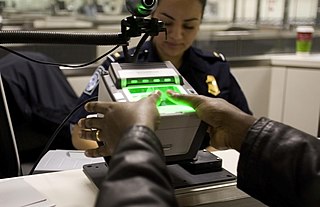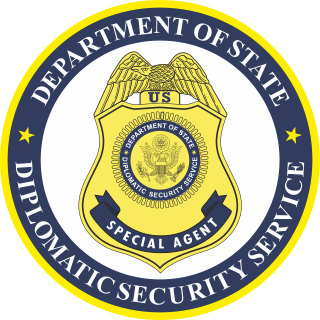Related Research Articles

United States Visitor and Immigrant Status Indicator Technology is a U.S. Customs and Border Protection (CBP) management system. The system involves the collection and analysis of biometric data, which are checked against a database to track individuals deemed by the United States to be terrorists, criminals, and illegal immigrants. US-VISIT is accessed by 30,000 users from federal, state, and local government agencies. Upon Presidential approval of the 2013 Continuing resolution the US-VISIT program officially became the "Office of Biometric Identity Management" (OBIM), save for portions of the agency which performed overstay analysis being transferred into U.S. Immigration and Customs Enforcement and biometric Entry and Exit operations which became a part of U.S. Customs and Border Protection.

The Bureau of Diplomatic Security, more commonly known as Diplomatic Security, or DS, is the security and law enforcement arm of the United States Department of State. DS is a world leader in international investigations, threat analysis, cyber security, counterterrorism, security technology, and protection of people, property, and information. DS's mission is to provide a safe and secure environment for officials to carry out U.S. foreign policy.

The United States Diplomatic Security Service is the federal law enforcement and security arm of the U.S. Department of State. It is responsible primarily for protecting diplomatic assets, personnel, and information, and combating visa and passport fraud. The agency's activities include counterterrorism, counterintelligence, cybersecurity, and criminal investigations.
The Bureau of Consular Affairs (CA) is a bureau of the U.S. Department of State reporting to the Under Secretary of State for Management. The mission of the Bureau is to administer laws, formulate regulations and implement policies relating to the broad range of consular services and immigration. As of 2020, the bureau is headed by the Acting Assistant Secretary of State for Consular Affairs, Mora Namdar.

The National Crime Information Center (NCIC) is the United States' central database for tracking crime-related information. The NCIC has been an information sharing tool since 1967. It is maintained by the Criminal Justice Information Services Division (CJIS) of the Federal Bureau of Investigation (FBI) and is interlinked with federal, tribal, state, and local agencies and offices.
The USA PATRIOT Act was passed by the United States Congress in 2001 as a response to the September 11, 2001 attacks. It has ten titles, each containing numerous sections. Title IV: Protecting the Border aims to prevent terrorism in the USA through immigration regulations. The provisions of the title generally increase the difficulty of entering the country for those known to have, or suspected of having, terrorist intent.
The Criminal Justice Information Services Division is a division of the United States Federal Bureau of Investigation (FBI) located in Clarksburg, Harrison County, West Virginia. The CJIS was established in February 1992 and is the largest division in the FBI.
Investigative Data Warehouse (IDW) is a searchable database operated by the FBI. It was created in 2004. Much of the nature and scope of the database is classified. The database is a centralization of multiple federal and state databases, including criminal records from various law enforcement agencies, the U.S. Department of the Treasury's Financial Crimes Enforcement Network (FinCEN), and public records databases. According to Michael Morehart's testimony before the House Committee on Financial Services in 2006, the "IDW is a centralized, web-enabled, closed system repository for intelligence and investigative data. This system, maintained by the FBI, allows appropriately trained and authorized personnel throughout the country to query for information of relevance to investigative and intelligence matters."
The Terrorist Screening Database (TSDB) is the central terrorist watchlist consolidated by the Federal Bureau of Investigation's Terrorist Screening Center and used by multiple agencies to compile their specific watchlists and for screening. The list was created after the September 11 attacks.
The Terrorist Identities Datamart Environment (TIDE) is the U.S. government's central database on known or suspected international terrorists, and contains highly classified information provided by members of the Intelligence Community such as CIA, DIA, FBI, NSA, and many others.
The Interagency Border Inspection System (IBIS) is a United States computer-based system that provides the law enforcement community with files of common interest. IBIS provides access to the Federal Bureau of Investigation National Crime Information Center (NCIC) and allows its users to interface with all 50 U.S. states via the National Law Enforcement Telecommunications System (NLETS). IBIS physically resides on the Treasury Enforcement Communications System (TECS) at the U.S. Customs and Border Protection Data Center.
A government database collects information for various reasons, including climate monitoring, securities law compliance, geological surveys, patent applications and grants, surveillance, national security, border control, law enforcement, public health, voter registration, vehicle registration, social security, and statistics.
The Interstate Identification Index, AKA “FBI Triple I Teletype”, is a national index of criminal histories in the United States of America, maintained by the Federal Bureau of Investigation (FBI) at the National Crime Information Center (NCIC). Included in this index are individuals who have been arrested or indicted for "a serious criminal offense anywhere in the country".

Security Advisory Opinion (SAO) or Washington Special Clearance, commonly called security clearance, administrative clearance, or administrative processing, is a process the United States Department of State and the diplomatic missions of the United States use in deciding to grant or deny a United States visa to certain visa applicants. The process involves sending a request from the visa issuing post to the Department of State's headquarters in Washington, D.C., to investigate an individual's case for possible espionage, terrorism, and illegal export of technology out of the United States.

Visa requirements for United States citizens and non-citizen nationals are administrative entry restrictions by the authorities of other states placed on citizens of the United States.

Visa requirements for Lithuanian citizens are administrative entry restrictions imposed on citizens of Lithuania by the authorities of other states. As of 13 April 2021, Lithuanian citizens had visa-free or visa on arrival access to 183 countries and territories, ranking the Lithuanian passport 10th in terms of travel freedom according to the Henley Passport Index.
Computerized Criminal History
Criminal records in the United States contain records of arrests, criminal charges and the disposition of those charges. Criminal records are compiled and updated on local, state, and federal levels by government agencies, most often law enforcement agencies. Their primary purpose is to present a comprehensive criminal history for a specific individual.

Although the European portion of France is part of the Schengen Area, its overseas departments, collectivities and other territories apply their own visa policies, which have some additional exemptions or restrictions compared to the visa policy of the Schengen Area.
The Consular Consolidated Database (CCD) is a database used by the Bureau of Consular Affairs under the United States Department of State, that has over 290 million passport records, 184 million visa records, and 25 million records of U.S. citizens living overseas, and adding 35,000 visa cases a day.
References
- 1 2 3 4 5 6 "Consular Lookout and Support System (CLASS) PIA" (PDF). September 1, 2018. Retrieved April 30, 2021.CS1 maint: discouraged parameter (link)
- 1 2 "Consular Lookout and Support System (CLASS) PIA" (PDF). May 24, 2016. Retrieved April 30, 2021.CS1 maint: discouraged parameter (link)
- ↑ Wasem, Ruth Ellen (November 18, 2015). "Immigration: Visa Security Policies" (PDF). Congressional Research Service . Retrieved November 21, 2017.CS1 maint: discouraged parameter (link)
- ↑ Border Security: Visa Process Should Be Strengthened As an Antiterrorism Tool. United States Government Accountability Office. October 13, 2002. Retrieved April 30, 2021.CS1 maint: discouraged parameter (link)
- ↑ "Border Security: Strengthened Visa Process Would Benefit from Additional Management Actions by State and DHS". September 13, 2005. Retrieved April 30, 2021.CS1 maint: discouraged parameter (link)